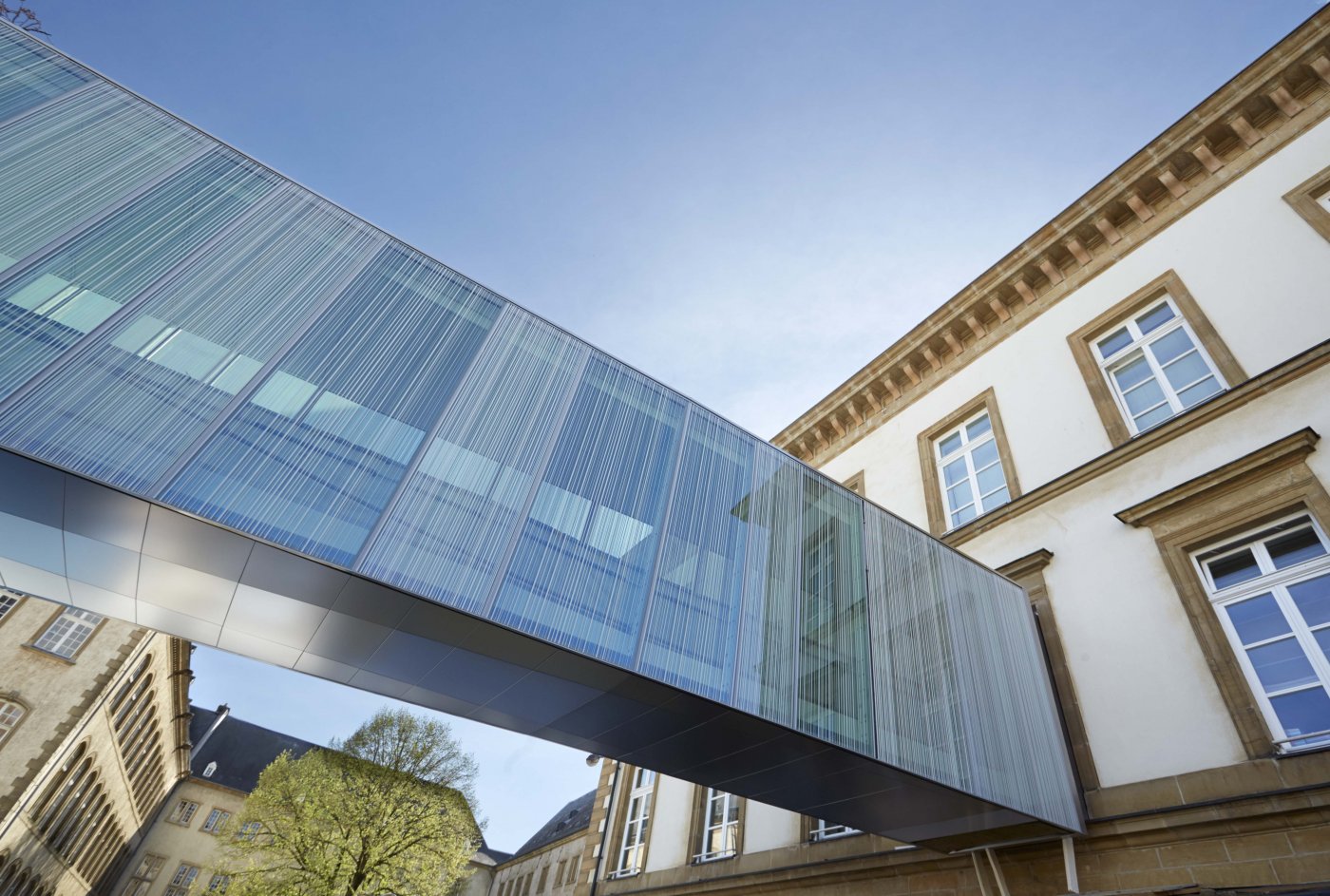Summary record
Video
Marriage ceremonies in places other than City Hall
Question by Tom Krieps
In accordance with the City's rules of procedure, I would like to ask you a question regarding a recent statement by Minister of Justice Felix Braz.
In responding to a question by MP Max Hahn, Minister Braz referred to the Law of 12 July 2014, which allows for marriage ceremonies to be regularly performed outside the usual locations, such as the town hall.
It seems to me that there is nothing in our city's regulations that provides for this type of ceremonial tourism. Hence my question:
- What is the City of Luxembourg's policy regarding requests to hold marriage ceremonies outside of its city hall?
- And if this an option, are there any locations that the City has designated for this purpose?
Response by Lydie Polfer
The mayor pointed out that Article 75 of the Luxembourg Civil Code, as amended by the Law of 4 July 2014, clearly designates the city hall as the place where marriage ceremonies should be held, stipulating that on the date specified by the parties, after the notice period under the banns of marriage, the civil registrar shall, at the city hall, read out to the parties the aforementioned documents regarding their civil status and the marriage formalities. In addition, Article 22 of the Municipal Law of 13 December 1988 stipulates that the municipal council shall meet at the city hall or at another location to be designated by the municipal council, subject to the approval of the Minister of the Interior. This provision allows for the designation of another location, subject to compliance with the procedure for doing so as provided for in the aforementioned municipal law. After deliberation, the municipal council has already designated an additional adjoining room to the city hall as a venue for marriage ceremonies, on the grounds that this room is an integral part of the city hall.
Although there are exceptional cases when the civil registrar is required to perform a marriage ceremony outside City Hall – such as in a prison or medical clinic – these are exceptions, which are subject to compliance with a specific procedure. However, it is possible that the legal framework may change in the coming years. Nevertheless, in practice, allowing marriage ceremonies to be performed outside the city hall could complicate the work of the civil registrars and municipal workers, and it would also be difficult to establish criteria setting restrictions on requests by couples who may wish to get married outside of City Hall.
Sanitary facilities in Merl Park and in the playgrounds and parks of Luxembourg City
Question by François Benoy
Our parks and playgrounds are extremely popular with residents and visitors alike, especially during the summer. With the renovation of the pavilion, Merl Park has become an even more attractive recreation spot. However, it seems to me that the sanitary facilities could be improved. Currently, there is only one self-contained toilet unit (sanisette) open to the public. The toilets in the pavilion are reserved for restaurant customers.
At an advisory committee meeting (on urban planning and the environment) held on 11 February 2015, a few members of the committees highlighted the need to install public toilets, especially since the toilet unit is not suited to the needs of children, the elderly or people with physical disabilities.
As I have received a number of comments from residents on the sanitary facilities in Merl Park, in accordance with Article 9 of the municipal council's rules of procedure, I would like to put the following questions to the college of aldermen:
- What is your assessment of the situation regarding the sanitary facilities in Merl Park?
- Bearing in mind that the sanitary facilities in the municipal park (Av. Monterey) and in Kaltreis, for example, are of much better quality, shouldn't we replace the toilet unit with a better model?
- Could you please give me an overview of all the sanitary facilities in the playgrounds and parks in our city?
Response by Serge Wilmes
Alderman Wilmes noted that the City is also of the view that the self-contained toilet unit is no longer suited to the public's needs, and that many visitors prefer to use the pavilion toilets. Although he could not explain why the sanitary facilities had not been renovated at the same time as the pavilion, he stated that the City plans to have the public toilets in the parks and playgrounds replaced with so-called Swiss-model sanitary facilities, which are cleaner and more accessible. There have already been discussions with the finance committee to prepare a budget for the redevelopment of the Merl Park playground, which includes the replacement of the self-contained toilet unit with Swiss-model toilets.
Regarding the overview of all the sanitary facilities in Luxembourg City's playgrounds and parks, he reported that:
- the playground in the Spillschëff municipal park has so-called "standard" toilets, the Cents park has Swiss-model toilets,
- the Ritterbuerg playground in Schéiwisschen has so-called "standard" toilets, which will be replaced in 2019 by the Swiss model,
- the new playground in Limpertsberg, on Rue de l'Avenir, has Swiss-model toilets,
- the Skaterpark-Pétrusse has Swiss-model toilets,
- the Kaltreis playground has Swiss-model toilets,
- and Mansfeld Park has Swiss-model toilets.
In the short term, Swiss-model sanitary facilities will also be installed in Merl Park and Laval Park. In conclusion, most of the City's parks and playgrounds are equipped with modern sanitary facilities.
Rue Henri Vannérus car park near the Pinocchio childcare centre
Question by François Benoy
I am contacting you about the small, six-space car park located in the middle of Rue Henri Vannérus in Luxembourg-Bonnevoie, near the Pinocchio childcare centre. Neighbours have reported that three abandoned cars are parked in this car park.
To seek a solution to the problem, I informed our departments of the situation in May. It turns out that the car park is a municipal property that, however, is not regulated and therefore is not monitored by our employees. Neither the Service Circulation (Traffic Department) nor the Service Parking (Parking Department) seems to have the authority to follow up on these issues.
As such, I would like to put the following questions to the college of aldermen:
- Can you confirm that these parking spaces, which are on a municipal property and accessible to the public, are not regulated?
- Don't you think it would be necessary to regulate this car park and subsequently have our staff monitor it?
- Could you please take whatever steps are necessary to have the abandoned cars removed?
Response by Patrick Goldschmidt
Alderman Goldschmidt confirmed that the parking spaces on Rue Henri Vannérus are located on a municipal property that is not regulated. In the absence of regulations, municipal enforcement staff have not taken action.
A decision has been taken to regulate this property so users can park there, either by using a parking disc or by buying a parking ticket, which would ensure that the parking spaces are not permanently occupied.
The police have been informed about the three abandoned vehicles in the car park so they can proceed with their removal.
Lastly, it is likely that the lack of regulations stems from the fact that the car park is located next to a childcare centre and a school, and so users could park there without a parking ticket or disc.
Place de Strasbourg playground
Question by Tom Krieps
The Place de Strasbourg playground opened a while ago and is a hub of activity for the children of the district. This playground is enclosed by a fence and the gates used to be closed in the evening and opened to the public in the morning.
I am speaking in the past tense because, for some time now, the playground has remained open overnight.
Consequently, people with no reason to be there loiter in the playground, or use it as a hiding place for illegal activity. Hence my question:
- Shouldn't we ensure that this playground is locked at night?
Response by Serge Wilmes
Alderman Wilmes replied that two municipal departments are currently in charge of opening and closing gates to the playground: the Services Parcs (Parks Department) opens them in the morning and the Service Parking (Parking Department) closes them at night.
The gates are fitted with locks, but sometimes they get broken. When this is the case, the gates remain open until the locks can be repaired or replaced. However, he had received confirmation that the locks are currently working.
In closing, admittedly, some people who have no reason to go to the playground do indeed loiter there and it is sometimes hard for the Service Parking to turn them out at night.
New vel'OH! electric bikes
Question by Sam Tanson
According to a news article published today, the new vel'OH! self-service electric bikes will not be ready for Mobility Week; their installation, which has originally been scheduled for June, has already been postponed. We believe it is important to bring the problems at hand to the attention of the members of the municipal council inasmuch as this is a major contract for the city. As such, I would like to put the following questions to the college of aldermen:
- What are the reasons for this postponement?
- What are the legal consequences of this latest delay? Are there any penalties due, and is the college of aldermen, as is mentioned in the article, considering cancelling the contract?
- If the contract continues, what is the deadline for installing and commissioning all of the new stations?
- Will an Urban Mobility Committee meeting be called promptly to inform the municipal councillors about the problems at hand?
Response by Patrick Goldschmidt
Alderman Goldschmidt responded that the new vel'OH! self-service bike system is expected to be up and running on 30 November 2018.
At a meeting in April, the Urban Mobility Committee voted in favour of implementing the new bike rental system. The committee has not met to discuss the delay on the part of the supplier, JCDecaux, because a choice was made to convey the information through the media, which puts pressure on the college of aldermen to follow up the matter.
Although committees are not systematically convened to discuss every news item that is published, the Urban Mobility Committee met again recently and the issue of the delay in implementing the new self-service bike system was on the agenda.
The tender specifications stipulate that the new system was supposed to be ready for this summer. In spring 2018, JCDecaux informed the college of aldermen that delivery would be delayed due to a delay on the part of their battery supplier. Then on 30 August 2018, JCDecaux informed the college of alderman that the system would not be ready in time for Mobility Week, but did not provide a new projected delivery date. This second delay is due to technical issues JCDecaux needed to resolve with regard to components of the new system – the first of its kind to be implemented in Europe – which did not operate as expected during tests. Around the beginning of November 2018, the college of aldermen was informed that the new commissioning date was 30 November 2018.
Lastly, the tender specifications stipulate the payment of late fees, and the City's legal affairs department has been tasked with claiming the penalties in accordance with the contractual clauses.
Green hue of the Pétrusse
Question by Tom Krieps
I would like to ask you a question about the Pétrusse.
As of today, the Pétrusse has been sporting St Patrick's Day colours, rivalling its big sister in the United States, the Chicago River.
I am passing around a photo that I consider troubling, to say the least.
- Since I assume that Luxembourg City was not planning to celebrate the patron saint of Ireland on 19 March, could you tell me what the source of this colour is?
- What is the environmental impact of this pollution?
Response by Simone Beissel
Alderwoman Beissel explained that the green hue comes from a product called uranine, which is a fluorescent tracer dye. It is a frequently used product that is poured into water when testing the tightness of drinking water mains and discharge channels, and it is 100% organic and freely available. It is in no way harmful for people or water components, and it disappears naturally after a few hours.
There is no way of knowing how this product ended up in the river, but it was probably put there by private individuals. In conclusion, the only problem it could have caused is an aesthetic one.
Self-service e-scooter in Luxembourg City
Question by Maurice Bauer
An article in today's Paperjam mentions an announcement by a company called Troty that it will be introducing, in Luxembourg City, self-service e-scooters that do not go faster than 25 km/h. The article also reported that a trial is currently being conducted with five scooters. With this in mind, I would like to ask the college of aldermen the following urgent question:
- Is the college of aldermen aware of this initiative? Has any contact been made with the contractor to "find the best solutions", as the article reports?
- Has the City issued or must the City issue permits for such an initiative?
- What is the legal framework for e-scooters in Luxembourg City? Can/must they be used on the road network? Are they allowed in bicycle lanes or on the pavement?
- The City's approach has always been to avoid self-service bikes without bike stations to spare itself the unfortunate experiences of other cities. Has this approach changed?
Response by Patrick Goldschmidt
Alderman Goldschmidt said that Troty is a commercial company – that is, a private entity – that is active in other cities.
Troty has decided to set up operations in Luxembourg City. In October 2018, Troty contacted the City to propose a collaboration – including a financial one – probably to lower the rental price for the e-scooters. The fact remains that the City is not a partner in this undertaking. He also stated that it nonetheless appears that Troty e-scooters are currently being used, but that the City is not very enthusiastic about the concept because 1) the Troty scooters are attached to lighting poles, and 2) the City already has two services for getting around (vel'OH! and CARLOH), whose subscription fees are much lower than the scooter rental price.
As for permits, the legal framework is not clear at the national level. The City has requested that regulations be established as soon as possible since modes of transport similar to e-scooters are cropping up more and more in Luxembourg City. However, we will need to see how the laws change before we can take action.
Negotiations between Luxtram S.A. and workers
Question by Joël Delvaux
Councillor Delvaux raised the urgent issue, set out in his letter of 14 November 2018, of the negotiations between Luxtram S.A. and the trade unions representing the company's workers (OGBL and FNCTTFEL). He explained that there are strong disagreements regarding the salary scales and working conditions, with the salary scales being lower and the working conditions being more burdensome than those in force at CFL.
According to the trade unions, some work schedules provide for shifts extending from 9:18 to 21:50, that is, 12.5 hours. In addition, according to the trade unions, three employees have allegedly been on extended sick leave due to overwork. The negotiation process is about to enter a conciliation phase, hence his questions:
- As a Luxtram S.A. shareholder, what is the City's position regarding the ongoing negotiations?
- As the City holds one-third of Luxtram S.A.'s share capital, is the college of aldermen willing to urge its representatives on the Board of Directors to take a position in favour of the claims of Luxtram S.A.'s workers?
Response by Lydie Polfer
The mayor replied that the negotiations with the trade unions are being conducted by Luxtram S.A.'s management and that consequently the City cannot publicly disclose what was decided by the company's Board of Directors. However, she referred to Luxtram S.A.'s press release published several days earlier stating that the management is disputing the situation as presented by the trade unions.
In June 2018, Luxtram S.A. granted tram drivers an 11% pay rise, as well as an increase in the on-call bonus from €100 to €200. Drivers were also granted three additional days of annual leave, and in September 2018 Luxtram S.A. decided to also grant a 4% pay rise spread over three years. In principle, the duration of working time is 10 hours a day, and in exceptional cases 13 hours a day, depending on the company's needs, and employees who work 13 hours would receive additional compensation of €100 per day. A meeting was held on 16 November 2018 between Luxtram S.A.'s management and its staff, more than half of which was present, and the meeting was positive and productive.
The point of contention comes from the fact that some drivers, with the support of the trade unions, wish to be paid like drivers of public-sector transport whereas now they are paid like private-sector drivers (FLEA). However, Luxtram S.A. is not willing to align salaries with those of the public sector.
Consequently, one of the topics of discussion will be determining how the situation for a tram driver is comparable to that of a bus driver, who is subject to the vagaries and stress of road traffic.
In conclusion, as the trade unions have requested a conciliation, the legal procedure will follow its course, and consequently we need to wait to see how the situation plays out, in the hopes that a consensus that satisfies all parties can be reached.

















